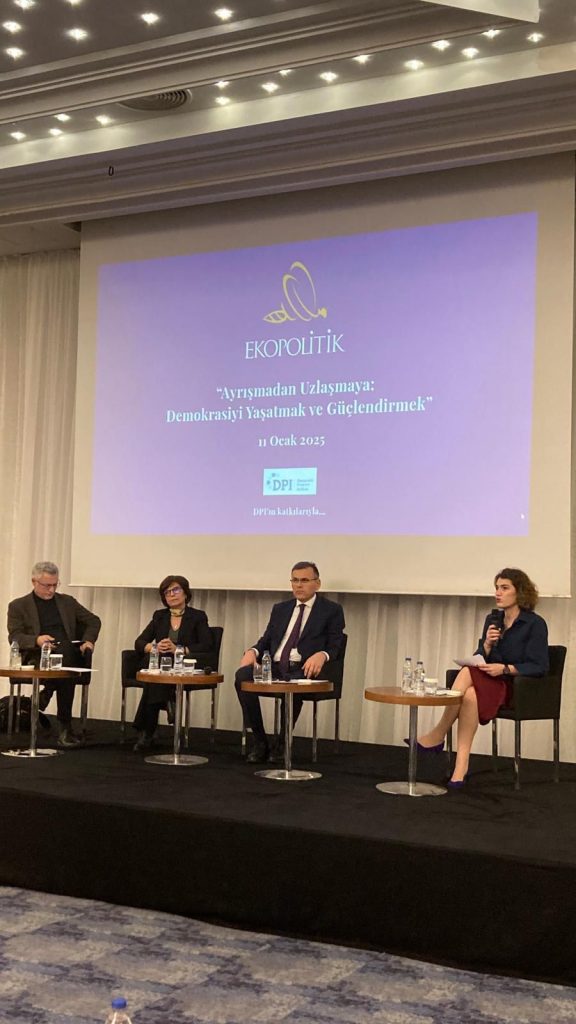DPI and Ekopolitik organized an event titled “From Divergence to Reconciliation: Sustaining and Strengthening Democracy” in Istanbul on 11 January. A diverse group of politicians, policymakers, academics, journalists, civil society members, and experts attended the event. Sevtap Yokuş, a member of DPI’s Council of Experts, and Zeynep Ardıç, DPI’s Senior Regional Analyst, delivered presentations. The event featured three panels focused on democratisation in Türkiye.
The first panel, titled “Türkiye’s Democratic Journey,” explored the country’s democratisation journey from a historical perspective, examining the socio-political, emotional, and institutional dynamics, along with challenges and achievements over time. Moderated by Mithat Sancar, the panel featured Tarık Çelenk, Bekir Ağırdır, İpek Çalışlar, and Taha Akyol. Discussions centred on Türkiye’s current socio-political problems, including democratic backsliding, the economic crisis, and the erosion of public trust and hope. The previous peace process was analysed, and recent developments regarding a new peace initiative were evaluated from multiple perspectives.
The second panel, titled “Pathways to Democratic Renewal,” focused on democratic renewal, reducing social polarization, and transitional justice. Moderated by Cansu Çamlıbel, the panel included presentations by Pierre Hazan, Uğur Özdemir, and Mustafa Ceric. Hazan provided a comprehensive overview of transitional justice, while Özdemir conceptualized societal polarisation and offered insights into managing it. The panel discussed consensus-based democratic transitions and how international experiences could inform the Turkish context. Ceric shared insights from Bosnia’s experience with conflict and peace, offering valuable lessons for Türkiye.
The third panel, titled “Democratic Reforms for Constitution-Making,” addressed the critical role of the constitutional process in democratic reform. Moderated by Osman Can, it featured presentations by Ramazan Arıtürk, Sevtap Yokuş, and Zeynep Ardıç. This session highlighted the importance of an inclusive and participatory constitution-making process in fostering long-term democratic resilience in a post-polarisation era. The South African experience was cited as an example of how polarised societies can develop a constitution to address division. Discussions emphasized the necessity of a minimum democratic framework for addressing social issues and stressed the importance of upholding the rule of law and fundamental rights and freedoms—particularly freedom of speech and the media—as essential to conflict resolution and constitution-making.
Introductory speeches were delivered by the presidents of TÜSİAD (Turkish Industry and Business Association) and MÜSİAD (Independent Industrialists’ and Businessmen’s Association), Türkiye’s leading business associations. Their remarks underscored the importance of the rule of law and democracy in driving national development. The event concluded with a closing speech by Bülent Arınç, former Deputy Prime Minister of Türkiye, who emphasized the significance of a new peace initiative.
Overall, the event offered valuable discussions on democratising Türkiye and presented recommendations for moving forward. Participants stressed that the New Peace Initiative could play a pivotal role in advancing democratisation efforts. While the method, actors, and agenda of this initiative remain uncertain, contributing to its success is essential. The event underscored the urgency of seizing the current window of opportunity for peace.
